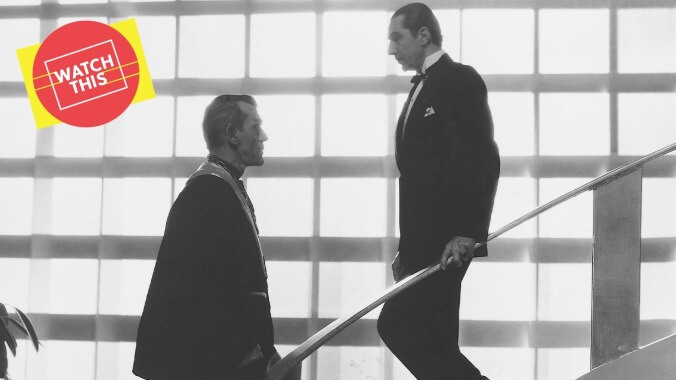It's Béla Lugosi versus Boris Karloff in a very loose take on Poe’s The Black Cat

Watch This offers movie recommendations inspired by new releases, premieres, current events, or occasionally just our own inscrutable whims. Because it’s Horror Week at The A.V. Club, we’re highlighting movies featuring major stars of the genre.
The Black Cat (1934)
Béla Lugosi secured his horror-icon reputation with Dracula, changing the shape of the world’s nightmares on film and stage throughout the early 20th century. But it was The Black Cat, the first of his pairings with frenemy Boris Karloff, that really proved his range. This is the film in which Lugosi utters the immortal words “Supernatural, perhaps. Baloney, perhaps not”—a line later sampled in everything from The Monkees’ Head to Sinbad’s Brain Damaged to Deee-Lite’s “E.S.P.” What the movie really offers, though, is centuries of European history playing out as the subtext of a battle between two Universal monsters in the aftermath of their most famous roles.
Very loosely inspired by the Edgar Allan Poe short story of the same name, The Black Cat casts Lugosi as Dr. Vitus Werdegast, one of Hungary’s great psychotherapists. That he kills a cat (off screen) should make the man unredeemable. But modern audiences, familiar with the concepts of post-traumatic stress, can perhaps overcome that kneejerk reaction. After all, Werdegast is back to a semblance of normal life after 15 years in a Siberian labor camp. He ended up there, as did thousands of other soldiers, because of the betrayal of Hjalmar Poelzig (Karloff), an Austrian architect who spent the intervening years getting into devil worship and low-level mad science. He also married Werdegast’s wife and daughter. So there’s a lot going on between these two well-dressed gentlemen—the grounded and earthy psychiatrist, rolling up his sleeves to save a life or improve a situation, and the glorious aesthete in Satanic finery that matches his widow’s peak, bristling with what comedian James Adomian calls “murdering slippers” energy.
The vast spaces of Poelzig’s castle, subdivided by spiral staircases, circular cells, opulent bedchambers, and the ticking munitions dump below its foundation, are in obedience to the Art Deco sensibilities of its master. Karloff has the showier role, playing a villain who claims women on sight with no regard for the social contract, dabbling in fetishes that there aren’t even names for. (Sexidermy? Generational subterfuge?) But this allows Lugosi to unmake prejudices in the audience and subtly educate about the state of post-WWI Europe. For this film to work, one has to believe that graciousness and concern can thrive even in the weirdest, most physically imposing of gentlemen. And the Lugosi versus Karloff interplay facilitates that, deliciously. An equalizing force born out of PTSD, Werdegast is too damaged—too other—to be the film’s hero. But there’s something endearing about him anyhow, as he instinctively battles every decadent impulse that Poelzig radiates.
A glamorous trip on the Orient Express. A black mass. A flaying. Programmer auteur Edgar G. Ulmer packs more into The Black Cat’s 65 minutes than most prestige shows do in an entire season, allowing the tone of pulp novelist George Carol Sims’ script (written under his Peter Ruric pseudonym) to jerk the audience around as though it were caught in some giant penny dreadful pinball machine. As for the enduring rivalry between the two stars, immortalized in Tim Burton’s Ed Wood biopic, a winner can be declared. It is not a Karloff imitation, after all, that lets Prince get the upper hand in a confrontation with his landlord in Under The Cherry Moon. Nor does Karloff get name-checked in the Bauhaus-composed goth national anthem. If one can even quantify cultural awareness, the modern world gives at least two fucks for Béla Lugosi.
Availability: The Black Cat is currently streaming for free on Classix. It can also be rented or purchased digitally from Amazon, Google Play, YouTube, Microsoft, Fandango, DirectTV, and VUDU.